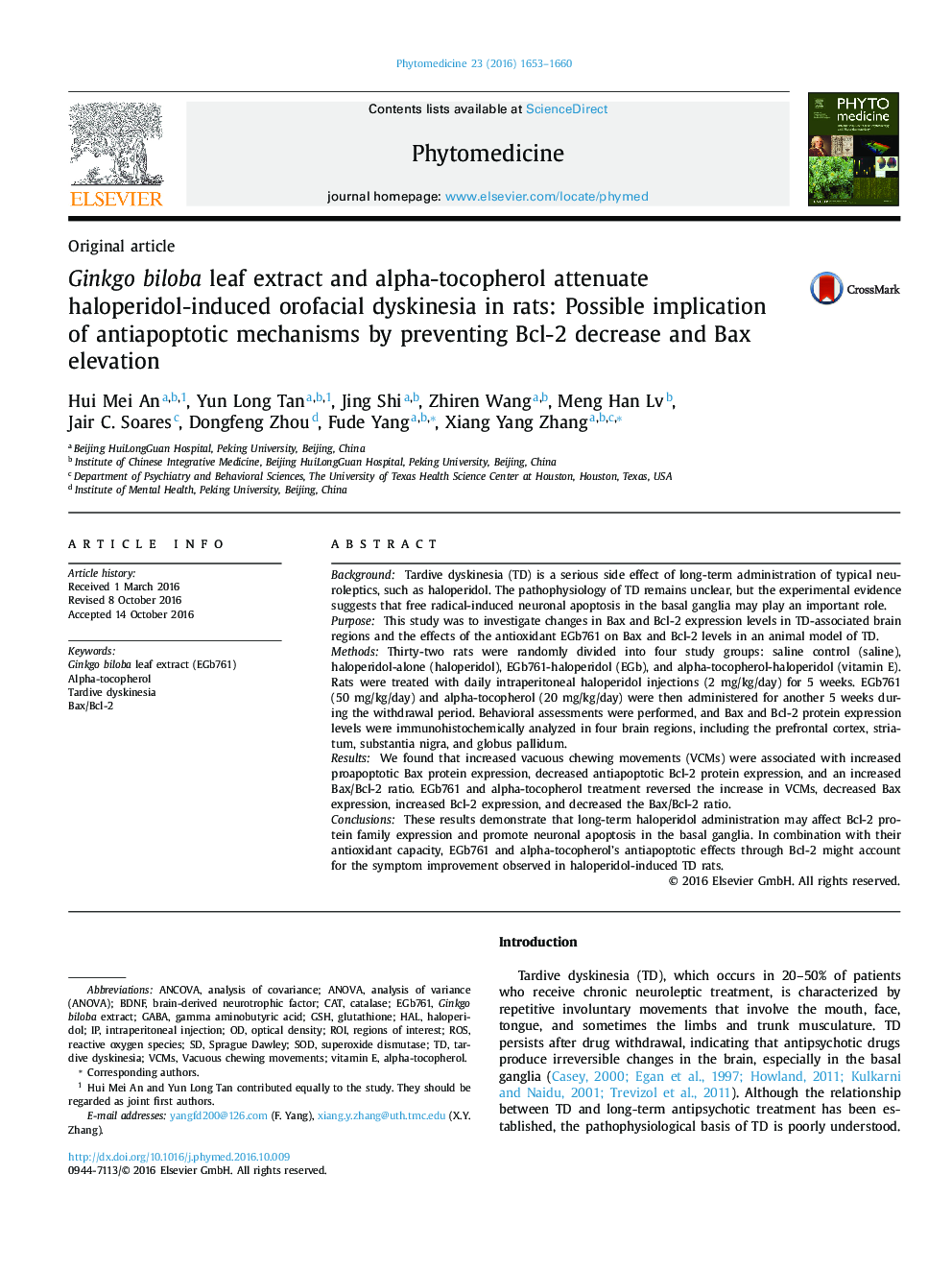| Article ID | Journal | Published Year | Pages | File Type |
|---|---|---|---|---|
| 5549460 | Phytomedicine | 2016 | 8 Pages |
BackgroundTardive dyskinesia (TD) is a serious side effect of long-term administration of typical neuroleptics, such as haloperidol. The pathophysiology of TD remains unclear, but the experimental evidence suggests that free radical-induced neuronal apoptosis in the basal ganglia may play an important role.PurposeThis study was to investigate changes in Bax and Bcl-2 expression levels in TD-associated brain regions and the effects of the antioxidant EGb761 on Bax and Bcl-2 levels in an animal model of TD.MethodsThirty-two rats were randomly divided into four study groups: saline control (saline), haloperidol-alone (haloperidol), EGb761-haloperidol (EGb), and alpha-tocopherol-haloperidol (vitamin E). Rats were treated with daily intraperitoneal haloperidol injections (2Â mg/kg/day) for 5 weeks. EGb761 (50Â mg/kg/day) and alpha-tocopherol (20Â mg/kg/day) were then administered for another 5 weeks during the withdrawal period. Behavioral assessments were performed, and Bax and Bcl-2 protein expression levels were immunohistochemically analyzed in four brain regions, including the prefrontal cortex, striatum, substantia nigra, and globus pallidum.ResultsWe found that increased vacuous chewing movements (VCMs) were associated with increased proapoptotic Bax protein expression, decreased antiapoptotic Bcl-2 protein expression, and an increased Bax/Bcl-2 ratio. EGb761 and alpha-tocopherol treatment reversed the increase in VCMs, decreased Bax expression, increased Bcl-2 expression, and decreased the Bax/Bcl-2 ratio.ConclusionsThese results demonstrate that long-term haloperidol administration may affect Bcl-2 protein family expression and promote neuronal apoptosis in the basal ganglia. In combination with their antioxidant capacity, EGb761 and alpha-tocopherol's antiapoptotic effects through Bcl-2 might account for the symptom improvement observed in haloperidol-induced TD rats.
Graphical abstractDownload high-res image (117KB)Download full-size imageThe B-cell lymphoma 2 (Bcl-2) family encodes specific proteins that regulate programmed cell death and can be used to reflect apoptosis. We found that increased vacuous chewing movements (VCMs) - an animal model for tardive dyskinesia were associated with increased proapoptotic Bax protein expression, decreased antiapoptotic Bcl-2 protein expression, and an increased Bax/Bcl-2 ratio. Administration of EGb761 and vitamin E reversed Hal-induced increased VCMs, decreased Bax expression, increasedBcl-2 expression, and decreased the Bax/Bcl-2 ratio. Our findings suggest that long-term haloperidol administration may affect Bcl-2 protein family expression and promote neuronal apoptosis. EGb761 and VE treatment may improve TD symptoms by their antiapoptotic effects through Bcl-2.
